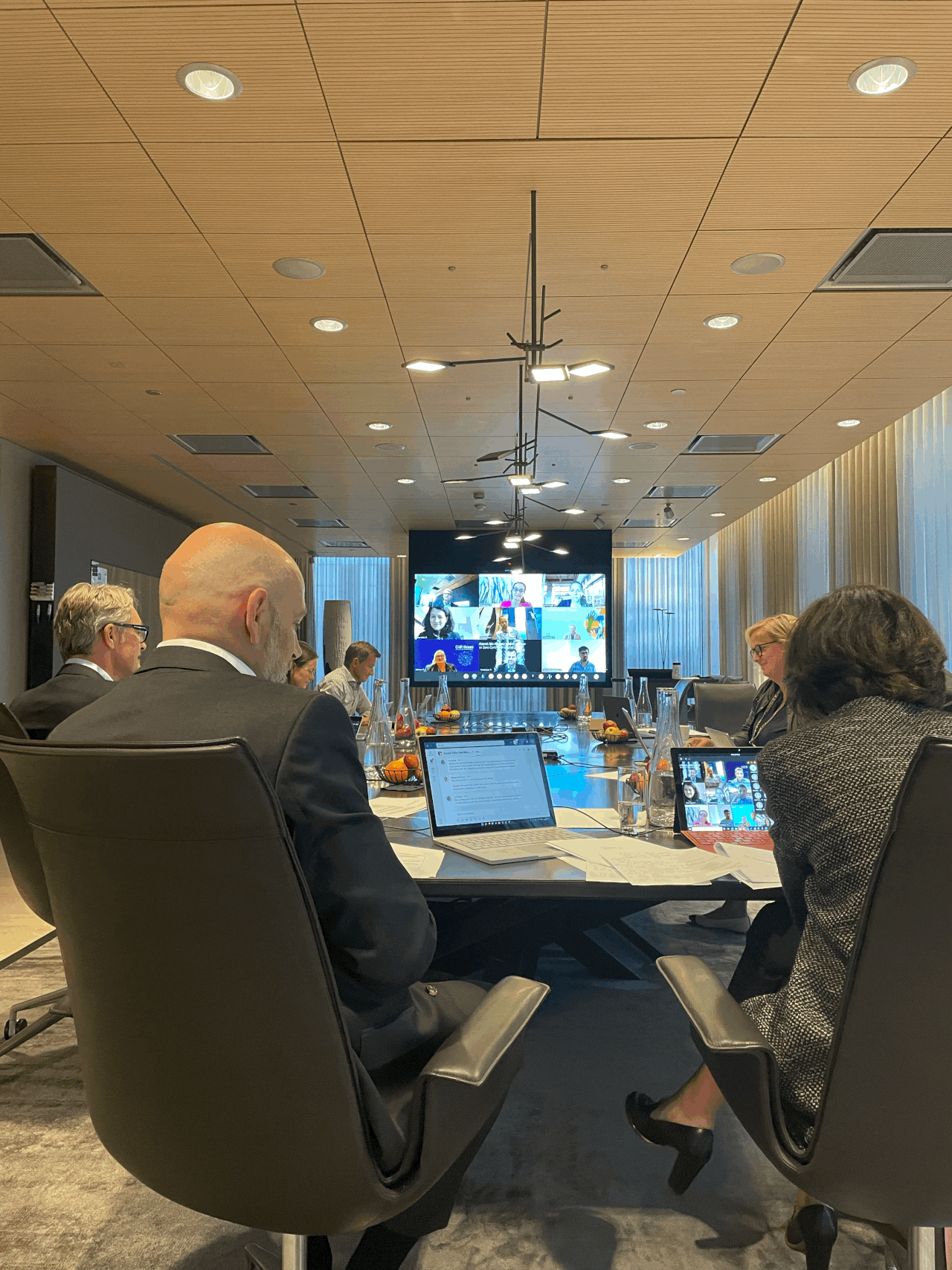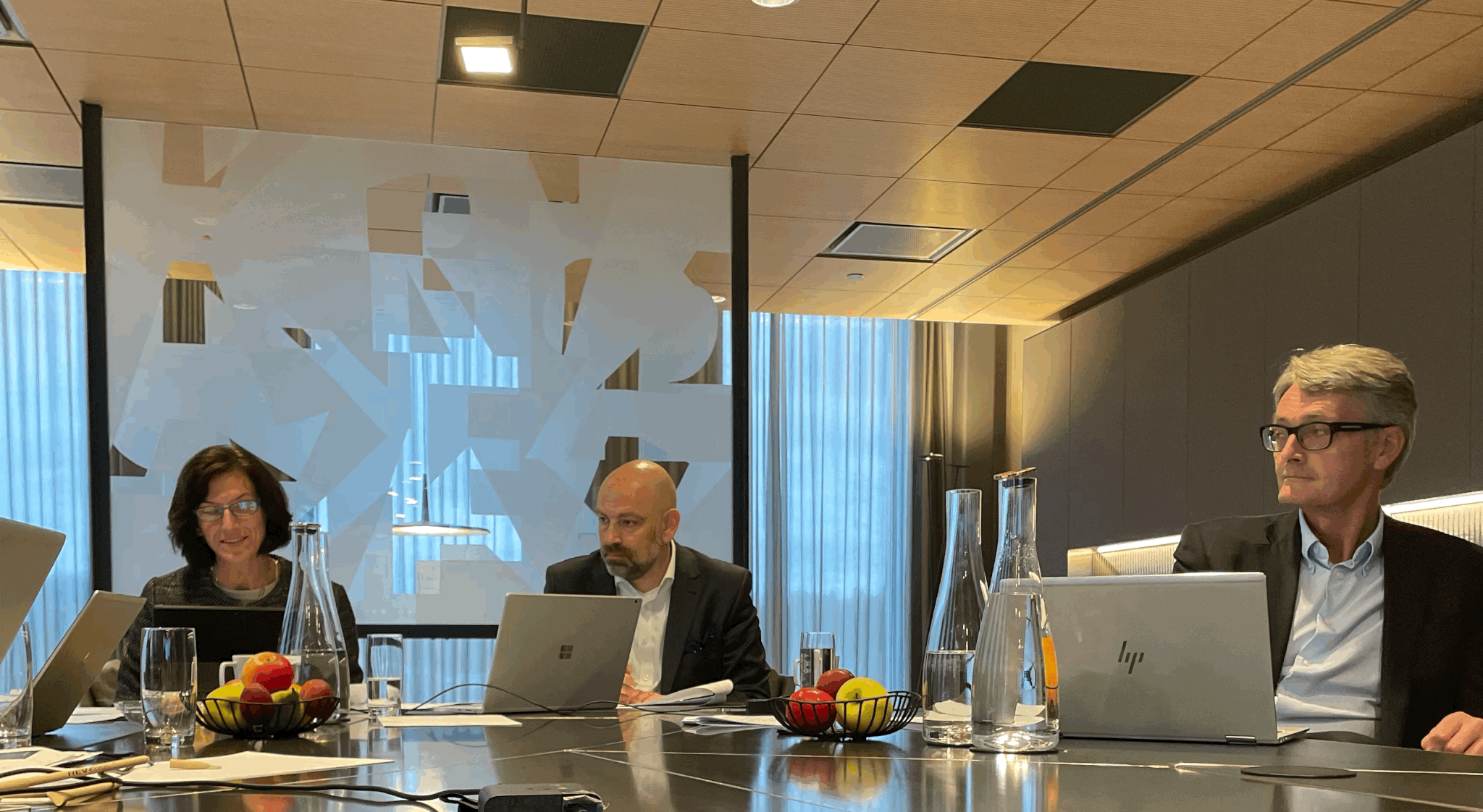Why we, global industry leaders, need to be lighthouses in ocean data sharing
We must change our mindset and be willing to share data. That is how you build trust in your business. We challenge all ocean industries to join us on the path to transparency, thus creating business opportunities. And a healthy ocean.
By Øyvind Eriksen, Chairman of the C4IR Ocean Board, and CEO of Aker, and Kimberly Mathisen, CEO of Microsoft Norway
This fall, C4IR Ocean and Microsoft hosted two executive roundtable meetings through our Ocean Data Action Coalition leadership.
Representatives from more than 20 international companies participated. The purpose was to promote data sharing and overcome the barriers that have prevented us in the past, using new technologies, better governance models, and more transparency.
C4IR Ocean is creating the world’s most important ocean data collaboration hub, using advanced technology so that both ocean health and the ocean economy can thrive. C4IR Ocean is an affiliate of the World Economic Forum's Centre for the Fourth Industrial Revolution (C4IR) network.
A triple win for the ocean – and businesses
Let us first explain the Ocean Data Action Coalition. In 2018, the 14 Heads of State of the High-Level Panel for a Sustainable Ocean Economy called upon the world to build a sustainable ocean economy. An ocean economy where effective protection, sustainable production, and equitable prosperity combined creates a triple win for people, nature, and the economy. By establishing the Ocean Data Action Coalition, Microsoft and C4IR Ocean are challenging some of the world's largest and most influential companies to do more for the ocean.
During the roundtable meetings, we challenged the representatives to think about what data their corporations collect but do not share. Together, we discussed the barriers of sharing ocean data and the potential business opportunities for those that do share. Several common themes emerged from the discussions, such as data governance, traceability, and added value.
These are significant discussions and give us insight into what we must overcome on the path ahead — always bearing in mind our ultimate goal: a productive and healthy ocean.
We find ourselves in a climate crisis. We are also in the midst of an industrial revolution – the fourth industrial revolution.
Every industrial revolution has had some common denominators: there are winners and losers. The winners have been able to adapt to the new technology and demands of markets and consumers. The losers were those who were dragging their feet, not being able to change and adapt — or doing so too late.
There is no doubt in our minds that being a part of ODAC is an opportunity to be at the forefront of a global revolution for data sharing, a decisive part of this industrial revolution.
100% building trust
Data is essential in understanding the changes taking place in the ocean and creating better management systems. Data will also underpin the future ocean economy, allowing businesses to make better decisions and find new opportunities.
There are already many excellent examples of how data sharing allows companies to operate more sustainably and find new business opportunities. Allow us to give you three from our own realm.
Recently, C4IR Ocean and the Norwegian Seafood industry’s digitization hub OPS Sjømat agreed on sharing data. Lice has been a major problem for the aquaculture industry. Outbreaks and treatments have led to considerable environmental impact, negative public opinion, and higher operational costs. By thorough research and development of a joint surveillance system, based on data sharing, the consumption of medicines to treat lice has drastically decreased. Now, the C4IR Ocean is taking it to the next level.
Would it be possible to look at all the data in the platform, not only the lice data, to try and predict what causes the outbreaks and get new insight as to what factors affect fish health? The C4IR Ocean’s answer is: yes.
Offshore wind is a renewal energy opportunity, and it is also a challenge. How can we choose where to place windfarms without damaging sensitive habitats or negatively impacting fishing or trade? We can fuse data from many different sources to give decision makers the tools and answers they need. Once operational, there will be a need to continuously monitor the environment to ensure there are minimal impacts and learn how to reduce them in the future. We are already seeing many new technological opportunities to design more effective monitoring systems, such as the use of machine learning to autonomously detect birds.
A third example is from the oil & gas sector. Aker BP and C4IR Ocean are working together to minimize discharge and emissions from offshore operations by optimizing energy and chemical consumption. Aker BP is providing data and operational expertise to create a solution that can be used by any operator to increase accountability and reduce environmental impact.
We have to be transparent
None of us can solve all the challenges facing the ocean alone, and that is why the Ocean Data Action Coalition is essential. Through ODAC, we work with companies worldwide to promote data sharing and overcome the hurdles that have prevented us from using new technologies, better governance models, and more transparency.
As for Aker, it is a fact that it is operating in industries under extreme pressure, shipping, fishing and oil & gas. We have to be transparent about what we do. All leading businesses today are 100% dependent on building trust in their business. Sharing data is part of building that trust. Trust and transparency are what governments, the finance and investment sector and consumers are looking for. We need to think of sharing data as a business opportunity, change our mindset and be willing to share data.
Being a part of Ocean Data Action Coalition is an opportunity to be at the forefront of a global revolution for data sharing, so that both ocean health and ocean economy can and will thrive. Those who act early will take advantage of an industrial revolution taking place right now. And we, leading ocean industries, must be those lighthouses in ocean data sharing. Let us at all times bear in mind the recent “code red for humanity” by the United Nations.
We dare to use the succinct and inspiring words of Amanda Gorman, the Inaugural Poet, also in this context:
For there is always light. If only we’re brave enough to see it. If only we’re brave enough to be it.
About Øyvind Eriksen:
Øyvind Eriksen is Chairman of the board in C4IR Ocean. Eriksen is the head of industry and President and CEO of the Norwegian industry group Aker ASA since 2009. He has held several board positions in different industries, including shipping, finance, asset management, offshore drilling, fisheries, media, trade and industry. He is also a member of the World Economic Forum C4IR Global Network Advisory Board.
About Kimberly Mathisen:
Kimberly Mathisen is a CEO and board member who loves the challenge of helping a company find new sources of energy, growth, and momentum. She is a passionate champion of the ocean and technology. Mathisen is coming from the role of as General Manager of Microsoft Norway. She has 20+ years of global leadership experience in areas such as digitalization and technology. Mathisen starts as CEO in the technology and sustainability foundation C4IR Ocean in January 2022.
About C4IR Ocean:
C4IR Ocean is an independent technology foundation , and it's signature projects focus on diagnosing and solving pressing ocean challenges, providing industry, governments and scientists a contextualised and fact-based understanding.
C4IR Ocean is part of the World Economic Forum (WEF) network of Centers for the Fourth Industrial Revolution. The World Economic Forum has set up 15 centres for the Fourth Industrial Revolution across the globe. C4IR Ocean is one of these. The centres work with governments, leading companies, civil society, innovators and science experts from different sectors to explore how to maximise the benefits of modern technology to solve critical societal tasks. Located in Oslo, Norway, C4IR Ocean is the only centre solely focusing on oceanic challenges.
The Centre is, together with Microsoft, also leading the Ocean Data Action Coalition on behalf of the Ocean High Panel Countries. The vision is a globally shared data revolution that will contribute to sustainable ocean management worldwide.
About the Ocean High Level Panel
The High-Level Panel for Sustainable Ocean Economy (Ocean Panel) is an initiative of 14 current world leaders building momentum towards a sustainable ocean economy.
Established in September 2018, the Ocean Panel has been working with governments, businesses, financial institutions, the science community and civil society to catalyze and scale solutions across policy, governance, technology and finance, and ultimately develop a new ocean action agenda for transitioning to a sustainable ocean economy. Conclusions were presented on December 2, 2020. The members are Prime Minister Morrison (Australia), Prime Minister Trudeau (Canada), President Piñera (Chile), Prime Minister Bainimarama (Fiji), President Akufo-Addo (Ghana), President Widodo (Indonesia), Prime Minister Holness (Jamaica), Prime Minister Suga (Japan) ), President Kenyatta (Kenya), President López Obrador (Mexico), President Geingob (Namibia), Prime Minister Solberg (Norway), President Remengesau (Palau) and Prime Minister Costa (Portugal). In addition, Peter Thomson, the UN Special Envoy for the Sea, is a support member.







